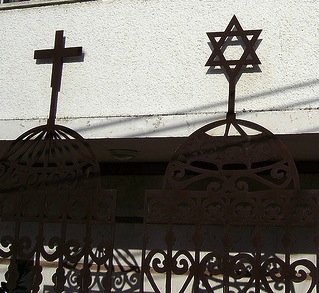
At times, planning an interfaith wedding feels like owning an obscure make of car. You go all around town trying to find parts for it, only to discover that no one has them. As it turns out, you need to make them yourself, in your garage. There aren’t even many reliable instructions online. It can seem like you’re on your own.
In-depth resources for interfaith couples building a life together are a fairly recent development. The website Interfaith Family is a fine place to start, as is Rabbi Devon Lerner’s book “Celebrating Interfaith Marriages.” Rabbi Lerner’s website is another good source of interfaith resources. In addition, my fiancée and I — she’s Lutheran, I’m Jewish — can seek out role models: interfaith couples who embody mutual support, spiritual congruence, and thoughtful parenting.
But back to Lerner for a moment. Her status as a Reform rabbi who openly supports interfaith marriage makes her something of an outlier. In her book, she notes that most rabbis, “will participate [in an interfaith wedding] only if you agree to raise your children Jewishly and only if they are the sole officiant.” For this reason, the person who will lead the Jewish elements of our wedding ceremony is not a rabbi but an “elder” from my childhood congregation in Detroit, Michigan. He and his wife have known me all my life, and his knowledge of and devotion to Judaism have earned him quasi-rabbinic status in the congregation.
Most rabbis who publicly support interfaith marriage, and will thus (co-)officiate at interfaith weddings, are secular humanist. Rabbi David S. Gruber, aka the Interfaith Wedding Rabbi, is a prime example. Depending on your point of view, his shift from Orthodox Judaism to officiating at interfaith weddings across the globe may strike you as sweet, opportunistic, or maybe a little of both.
For secular humanists, Judaism is nontheistic. What makes them Jewish, rather than faith in God, is their connection to Jewish history and culture. Because secular humanism is a small, quirky branch of Judaism, it does not face great pressure to keep mainstream Jewish tradition alive for centuries to come. Officially, theistic rabbis tend to endorse the view that Judaism’s future depends on within-faith marriage: Jews marrying other Jews. (As one might expect, such rabbis’ personal opinions on the subject vary).
From a certain perspective, this focus on within-faith marriage makes sense. When a Jew marries a Jew, the children are likely to be raised Jewish. When a Jew marries a Christian, as I will do in June, all bets are off. What will Judaism mean to the children? Will they identify as Jewish? Or will they tell people, “Yeah, my dad’s Jewish” in the same bored tone they’d use to say, “Yeah, my dad’s from Yakima”?
Someone recently described himself to me as Jewish down to his bones — in every atom of his being, he feels Jewish. I have never felt that way and probably never will. There have been times that I envied people who are so deeply rooted in their Jewish identity. But my own complicated relationship with Judaism affords me some unique opportunities.
For an institution that can draw on (at least) two rich traditions, interfaith marriage doesn’t come with a lot of “should”s. This means that my fiancée and I can develop customs and a home life that interweave elements of Judaism, Christianity, and our own ethics and aesthetics. If we have to handcraft the parts for that proverbial car, according to blueprints we design ourselves, well, that might turn out to be a lot of fun. (And, yes, hard work as well.)
There may be times when my fiancée’s Lutheranism and my Judaism don’t quite fit together. At our wedding rehearsal dinner, we’ll have a guest who keeps kosher. He’ll need a meal cooked in a kitchen that uses separate meat and dairy utensils and cooking surfaces. Since it will be a Friday night, we’ll probably recite Shabbat (Jewish Sabbath) blessings. Yet one of the two main courses at dinner will be chicken stuffed with prosciutto — which, being pork, is decidedly treyf (unkosher).
Then there’s the ceremony itself. Many people know that wine and bread are blessed and shared in both Judaism and Christianity. Nonetheless, communion during the wedding ceremony might make some Jewish guests uncomfortable, which is why we aren’t including it. Of course, there’s no disguising the sanctuary’s prominent cross (nor should there be). And what will it be like to have a chuppah in a Lutheran church?
If we have more questions than answers right now, that’s fine. Making an interfaith home and family takes time, intention, and a willingness to tolerate uncertainty. One thing, at least, is certain: With our wedding less than three months away, much work remains to be done.










Neal, read this article this morning and thought you might be interested in it: http://www.nytimes.com/2013/04/06/opinion/interfaith-marriages-a-mixed-blessing.html?_r=1&
I read her book, Til Faith Do Us Part. Very interesting and thorough. I would recommend.
I like this:
“I am no impartial observer. I’m a Conservative Jew married to a former Jehovah’s Witness, who is African-American. (We are raising our children Jewish.) Our country’s history of assimilation and tolerance is one reason I, a grandchild of Eastern European immigrants, can live as I do. It is why I could marry the man I wanted to, without fear of ostracism.
“So while I recognize that the diminishment of religious institutions and a rise in marital instability could be among the long-term effects of interfaith marriages, I cannot wish for the tide to ebb. Nor do I think it will.”